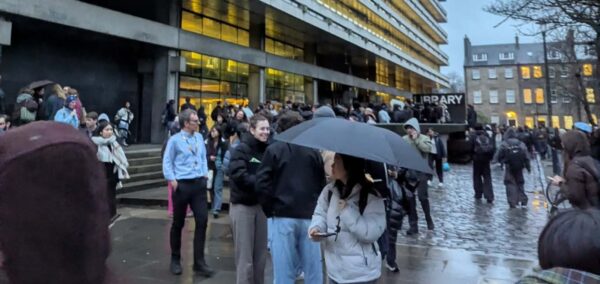
Opinion: I’m STILL paying £22k a year for the teachers to be underpaid
You know it’s bad when I have to do this twice
Three months after last semester’s November surprise strikes, nearly all UK uni students are experiencing the first of eighteen more days without classes today because of industrial action across 150 major universities. University staff will be striking 11 days in February (out of 20 working days), and an additional seven days in March.
While I love a four-day weekend as much as the next person (and five- and six-day weekend enjoyers will be happy to know we’re expecting one of those, too), I also know how much student loans my family had to take out for this school year. If I didn’t already know this number, my parents have made sure to remind me of the number regularly, too.
University is an expense for everyone regardless of tuition status, but it is definitely more of an expense for the non-Scottish student population here. For most degrees, Scottish students are paying £1,820, and English students £9,250. However, unlike British fees, international student tuition increases every year, and international first-year students this year are paying £23,100. Compare that to last year’s international tuition fee of £22,000, and it’s clear the university is balancing any of their cost-of-living financial crises by increasing the already whopping international tuition price.
Most Read
I wrote about the frustration of being an international student paying these fees only for it not to go to my teachers (or the use of the university buildings, or have in-person classes) last year, and now that we are again facing lots of time off and classes cancelled because of the Uni’s failure to provide its staff with living wages (that both reflect the full amount of hours they work as well as the increased costs of living nationwide), it was time for an update. And this time, I did more math!

This was my £22k university education last year
Looking at the university’s student numbers (from 2017-18), the most recent year available, the domicile regions of the university add up to a class of about 41,000 students, with Scottish students making up just under 30 per cent, other British and Irish students comprising another 25 per cent, and International/EU students filling the remaining 45 per cent of the student population.
Assuming this ratio stays consistent year after year, this means the average Edinburgh student that enrolled last year is paying the university around £12,750 a year, with this year’s class to have an even higher average fee due to increased international tuition.
Even with almost £13,000 per enrolled student, we are still facing strikes because the teachers are not being paid enough.

Students organizing in support of the staff and strikes
UCU general secretary, Jo Grady, explained the reasons for the enormous strike as “[the staff] refus[ing] to accept falling pay, cuts to pensions and insecure employment.
“This is not a dispute about affordability – it is about choices. Vice-chancellors are choosing to pay themselves hundreds of thousands of pounds whilst forcing our members onto low paid and insecure contracts that leave some using foodbanks.”
As reported earlier this semester, not only does Edinburgh’s Principal and Vice-Chancellor, Peter Mathieson—the newly knighted, gaining a “Sir” while university staff can’t even gain a salary proportional to their work—get £17,910 worth of his maintenance bills paid by university funding, in his university-owned residence worth nearly £2 million, and he also makes £340,000 a year. Meanwhile, this same man “has openly supported 35 per cent pension cuts for university staff, claiming it is the financially responsible thing to do.”

My very first in-person lecture (as a second year)
In the past few months, heating costs have gone up exponentially, food is more expensive (even the Tesco meal deal is now £3.40), and rent is insane—if you can even find a flat.
Students are struggling, budgets are tight, and everyone is affected by this situation, including university staff members.
The University—and the British higher education system at large—failing to pay its staff not only enough for their time and work, but also during this national crisis, is inexcusable. Worse yet, Mathieson is advocating staff pension cuts as the solution to this crisis.
I arrived back to school this year to a city-wide rubbish strike, we are experiencing a higher education strike, and currently, ambulance workers, nurses, and physiotherapy staff of the NHS are on strike. Things literally could not get much worse, and the University’s—and the U.K. government at large—lack of action for an years-long issue that the staff have been protesting and walking out over is pathetic.

Sir Mathieson and the other vice-chancellors in charge of British universities need to spend my hefty international tuition better. After last year’s five weeks of strikes, enough outrage was caused to start a class-action lawsuit against the many UCU universities, with students across the UK demanding some compensation for the education they lost.
Student Group Claim currently estimates that non-Scottish British and Irish students will be able to win back £5,000 of their tuition, with international students winning even more. While class-action lawsuits make lawyers richer (with this lawsuit taking up to 35 per cent of the money students may win back), this lawsuit still offers students a chance to win back some of the money their universities have squandered everywhere except on their staff, as well as finally push back against the inaction of universities to fix these strikes.
Staff need adequate pay to support themselves and their families in this ongoing financial crisis, and as an international student, my tuition needs to actually go to my education. It is an utter failure of university leadership that this is still going on.

A University of Edinburgh spokesperson said: “The ongoing industrial action is part of a national campaign and we are working with all appropriate groups, including UCU representatives, to secure a long-term outcome for the USS pension that is fair, affordable and sustainable for both individuals and employers.
“We are listening to staff and student concerns and have implemented a number of initiatives to address aspects of employment conditions and will continue to do everything we can to ensure impact on learning and teaching is minimised.
“As in previous years, we have set up a Learning Opportunity Fund using money not spent on staff salaries as the result of industrial action. If classes are impacted by strike action students will be able to apply for a payment which can be used for a variety of learning opportunities.”
Related stories recommended by this writer:
• ‘It’s harrowing’: Inside Edinburgh University’s failing payment system
• Scottish Government will consider a ban on disposable vapes
• Edinburgh strikes confirmed with 11 days taking place in February and seven in March

















